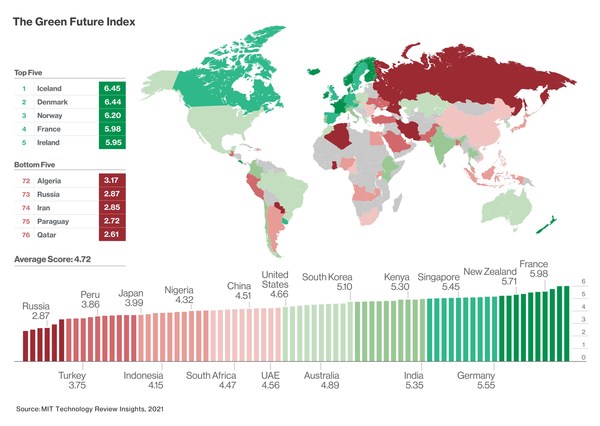CAMBRIDGE, Mass., Jan. 26, 2021 /PRNewswire/ -- The Green Future Index, a new study by MIT Technology Review Insights in association with Citrix, Morgan Stanley, and Salesforce ranks 76 countries and territories on the progress and commitment they are making toward a green future by reducing carbon emissions, developing clean energy, and innovating in green sectors, as well as the degree to which governments are implementing effective climate policies.
 (PRNewsFoto/MIT Technology Review Insights)
(PRNewsFoto/MIT Technology Review Insights)
The interactive index shows which countries are progressing fastest in global efforts to decarbonize and limit global heating in line with the goals of the Paris Agreement.
The key findings are as follows:
- Europe will be a future green leader. Europe dominates the top of the index, with 15 European nations in the top 20. Many countries across the region have already made progress with curbing emissions, transitioning energy production to renewable sources, and investing in green mobility. Since covid, the EU has committed more than €200 billion in bold green economy investments, accelerating decarbonization even in the most fossil-fuel dependent states.
- Iceland, Denmark, and Norway top the index. Iceland, in first place, aims to be carbon neutral by 2040. The country has become a world leader in clean energy and carbon capture technology. Denmark (2nd) is the largest producer of hydrocarbons in Europe to stop issuing new oil and gas exploration licenses. Norway (3rd) is also striving to decouple its economy from fossil fuels.
- Costa Rica and New Zealand secure top 10 positions. Costa Rica, ranked 7th, and New Zealand, ranked 8th, have made major strides with renewables and have world-leading agendas for decarbonization across industry and agriculture. Canada (14th), Singapore (16th), and Uruguay (20th), the other non-Europeans in the top 20, have strategies for decarbonization, transitioning energy sources, and government-led initiatives to promote green living, such as Singapore's Zero Waste Masterplan, which aims to reduce landfill waste by 30% between now and 2030.
- There is uneven progress across the world's largest economies. The United States (40th) has reduced emissions over recent years and is responsible for nearly one-fifth of the world's green patents. Yet it is emerging from four years of climate denial and remains heavily dependent on fossil fuels and unsustainable farming practices. China (45th) is responsible for more than one-quarter of global emissions but has pledged to become carbon neutral by 2060 and is the world's fastest growing producer of renewable energy. France (5th), Germany (11th), and Canada (14th) are the highest ranked countries in the G20.
- The countries at the bottom of the index risk losing competitiveness in the green economy. The laggards include South Africa (47th), Vietnam (49th), and Indonesia (57th), where economic pressures run counter to sustainable development. Japan (60th) has a goal to be carbon neutral by 2050, although government targets for renewable energy remain modest. The 16 "abstainer" countries at the bottom include petrostates such as Saudi Arabia, Iran, Qatar, and Russia. The latter's Energy Strategy 2035 for expanding oil and gas production identified the trend toward carbon neutrality as an existential threat.
"With hundreds of billions of dollars being injected into economies worldwide, covid-19 has created huge momentum for developing green industries and financing infrastructure that will be clean, technologically advanced, and climate resilient," says Nico Crepaldi, head of custom content, MIT Technology Review. "In the future, we're likely to see 'green' being synonymous with economic competitiveness."
To view the research findings, visit the interactive page or click here to download the report.
For more information, please contact us at insights@technologyreview.com
About MIT Technology Review
Photo - https://mma.prnasia.com/media2/1425763/mit_technology_review_insights_the_green_future_index.jpg?p=medium600